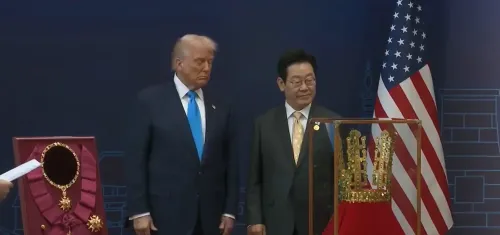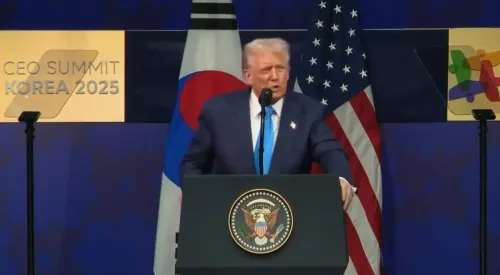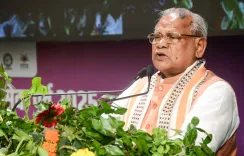Bangladesh's Interim Government: A Nation on the Brink

Synopsis
Key Takeaways
- Yunus's government lacks constitutional legitimacy.
- Wahhabi Islamists have escalated violence against Sufi Muslims.
- Law and order have collapsed throughout Bangladesh.
- Many industries have shut down due to anti-corruption measures.
- Public faith in the government is rapidly diminishing.
New Delhi: The esteemed US President Abraham Lincoln once remarked: "You can fool some of the people all of the time, and all of the people some of the time, but you cannot fool all of the people all of the time". The Chief Advisor of Bangladesh, Muhammad Yunus, should keep this in mind before making further justifications for his administration's failures. Within a mere seven months as the head of the Interim Government, he has driven Bangladesh closer to becoming a failed state.
The 2006 Nobel Peace Prize laureate took office on August 8, 2024, to much celebration. His appointment was heralded with much anticipation. Ideally, he was expected to provide fundamental governance, facilitate early elections, and transition power to a democratically elected authority. Until the constitutional amendment in 2011, during Sheikh Hasina's leadership, Bangladesh had a provision for a temporary interim government lasting 90 days, extendable to 180 days. Thus, the Yunus administration lacks constitutional validity.
Post-Hasina's departure, the President should have called upon Parliament to form a consensus government. However, Islamist factions and student groups, supported by Islamists, sought to gain power through subterfuge. They pressured the President to dissolve Parliament, creating a legal void, and positioned Yunus as a savior. The veteran economist fell for this scheme.
The Islamists manipulated Yunus, expecting him to leverage his personal appeal to navigate the legal void and extend the government's tenure by vowing to establish a "New Bangladesh". He indeed made grand promises, including altering the country's Constitution, which he had pledged to uphold. Initially, the public rallied behind him, hoping for brighter days ahead.
However, this optimism quickly faded. Self-serving factions exploited the situation to foster a strict Wahhabi Islamic regime. They perpetrated violence against Bangladesh's extensive population of moderate Sufi Muslims. Within the initial weeks and months of Yunus's leadership, at least 80 percent of Sufi shrines (Mazars) were demolished. Attacks were launched on commemorative festivals honoring the 19th-century Sufi artist Lalon Fakir. Religious minorities faced widespread persecution.
In July, during protests, Islamists executed targeted assaults on police stations and prisons. Substantial caches of advanced weaponry were seized from approximately 450 out of nearly 600 police stations in Bangladesh. At least three prisons were breached, releasing hundreds of terrorists previously imprisoned by the Sheikh Hasina government. Following the regime shift, they seized control of the streets.
Yunus further facilitated their agenda by releasing key commanders and conspirators amid much fanfare, while ignoring the brutalities committed by Islamists. In a stark reversal from Hasina's anti-terror efforts, Yunus effectively dismantled the entire anti-terror framework. Every key officer from the police and military involved in counter-terrorism operations now faces investigations and murder allegations. Some have been arrested, while others have fled. The police force, directly under civilian control, has been particularly impacted.
Numerous Awami leaders and Members of Parliament were detained, with many suffering fatal outcomes in custody. Thousands of journalists lost their positions for reporting in favor of the ousted Hasina government. A multitude of senior editors are confronting baseless murder accusations, with many imprisoned. Editorial roles in the media are now filled with Islamist appointees, and several media outlets have ceased operations. Leaders of religious minority communities were either imprisoned or hounded, often without access to legal representation.
The repercussions are starkly visible in Bangladesh's social and economic landscape. Law and order have deteriorated to unprecedented levels in the nation's history. Incidents of rape, murder, and lynching occur by the dozens daily in Dhaka, with even graver conditions in rural areas.
'Crime wave sweeps post-Hasina Bangladesh', reported the international news outlet 'The Diplomat' earlier this month, highlighting not only the rising vulnerability to crime but also the dwindling faith in the interim government. A March 8 report by BBC Bangla echoed this sentiment.
Crime and business cannot coexist. In just seven months, numerous industries have collapsed. In an effort to counter the remarkable economic growth experienced during Hasina's administration, the Yunus government launched an offensive against industrialists under the guise of anti-corruption initiatives. The country's leading industrialist is languishing in prison, with more than a dozen of his enterprises shuttered. He is not alone; industrialists in Dhaka are now vocally attributing the economic downturn to the Yunus administration. Thousands of jobs have been lost, with some individuals reportedly turning to crime.
Gone are the days of prosperity, optimism, and growth. Bangladesh now teeters on the brink of failure or is already classified as such. Many citizens who once viewed Yunus as a savior back in August 2024 now lament their misfortunes. Various surveys reveal that the current administration has failed to address the fundamental concerns of the populace, including law and order, inflation, and employment.
Only time will reveal Bangladesh's fate, but for the moment, the outlook appears grim.
(Deepak Kumar is an India-based foreign affairs and security analyst. The opinions expressed are personal)









